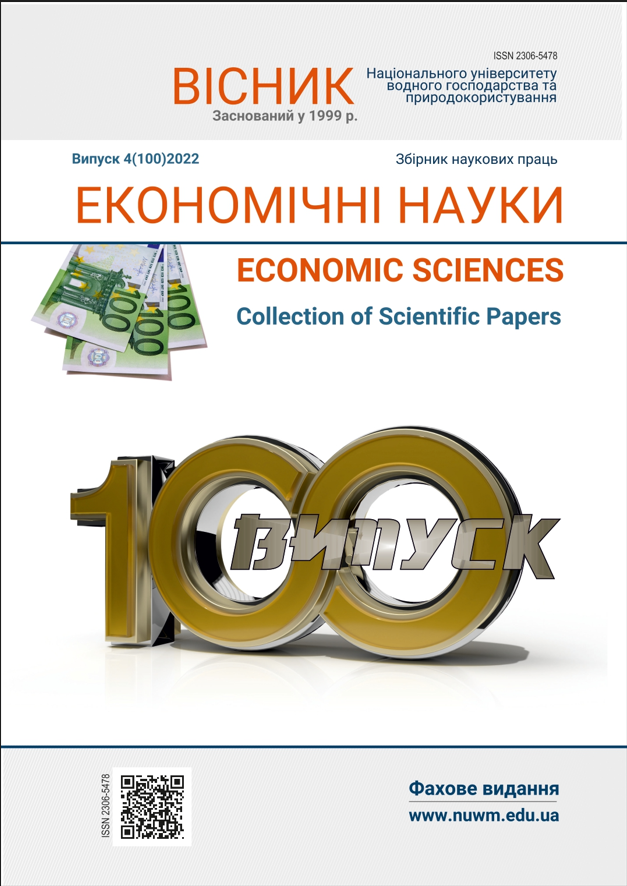PRACTICAL ASPECTS OF SUBSTANTIATION OF DECISIONS ON THE USE OF ANTI-CRISIS TOOLS AT THE ENTERPRISE
DOI:
https://doi.org/10.31713/ve420223Keywords:
insourcing, outsourcing, anti-crisis instruments, system efficiency, optimization, financial and economic instruments, outsourcing feasibility index.Abstract
The article defines the essence of insourcing and outsourcing, considers and analyzes approaches to their organization and implementation at the enterprise. The advantages of outsourcing in the context of scaling ideas and implementing innovations are given, a significant number of internal and external reasons for its use are indicated, and the need for a clear formation of goals and a plan for its implementation through the sequence of certain stages, usually by companies that have established effective business processes, as well as the possibility of their control even in the conditions of outsourcing, is emphasized. The authors consider insourcing as a form of economic relations, its relationship with outsourcing. It is argued that the main economic criterion for making a decision on insourcing can be the true cost, which will be reduced as a result of optimization and improvement of the quality of the business process. It is indicated that it is the development of insourcing that demonstrates both the expansion of the use of a systematic approach and the reduction of security risks of leakage of financial and other information about the work of the entity. The work emphasizes that the expediency of using insourcingincreases when an enterprise has temporary excess capacity or competitive advantages, and its ability to effectively use anti-crisis tools increases economic stability and anti-crisis potential. The article provides a list oftasks that should be performed by the enterprise in order to ensure the implementation of the insourcing project. To assess the feasibility of usinginsourcing, a methodology for quantifying the feasibility of transferring a project to outsourcing/insourcing is used. It is noted that when deciding on insourcing or outsourcing, it is mandatory to compare the current level of system efficiency in the basic configuration and its predicted, based on the results of the project, state. The results of calculations of outsourcing/insourcing feasibility indices at the enterprise are presented.References
Грибан С. В. Система антикризового управління підприємством. Ефективна економіка. 2013. № 11. URL: http://www.economy.nayka.com.ua/?op=1&z=2467 (дата звернення: 09.04.2019).
Kovshun N., Yakimtsov V., Nalyvaiko N., Sukhoniak S. Peculiarities of outsourcing services organization and realization. Estudios de Economia Aplicada. 2021. Vol. 38(4). 4022 DOI: http://dx.doi.org/10.25115/eea.v38i3%20(1).4022 (дата звернення: 07.11.2022).
Сазонов С. П., Езангина И. А. К содержанию процеса инсорсинга в сетевой модели организации бизнеса. Современные проблемы науки и образования. 2015. № 1-1. URL: https://science-education.ru/ru/article/view?id=18463 (дата звернення: 07.11.2021).
Інсорсинг. URL: https://uk.wikipedia.org/wiki/%D0%86%D0%BD%D1%81%D0%BE%D1%80%D1%81%D0%B8%D0%BD%D0%B3 (дата звернення: 07.11.2022).
Костриченко В. М. Інсорсинг: обґрунтування доцільності його використання як антикризового інструменту підприємства. Актуальні проблеми обліково-аналітичного забезпечення управління в умовах цифрової трансформації : матеріали Міжнародної науковопрактичної конференції, 7 квітня 2022 року. [Електронне видання]. Рівне : НУВГП, 2022. С. 25–28.
Курбанов А. Х. Методика оценки целесообразности использования аутсорсинга. Современные проблемы науки и образования. 2012. № 1.
Прохоренко О. В., Брінь П. В. Управління аутсорсингом на промисловому підприємстві : монографія. Харків, 2018. 236 с. URL:
https://core.ac.uk/download/pdf/185562739.pdf (дата звернення: 07.11.2022).
Тінтулов Ю. В. Оцінки доцільності аутсорсингу в корпоративних структурах харчової промисловості. Ефективна економіка. 2013. № 7. URL: http://www.economy.nayka.com.ua/?op=1&z=3074 (дата звернення: 07.11.2022).

